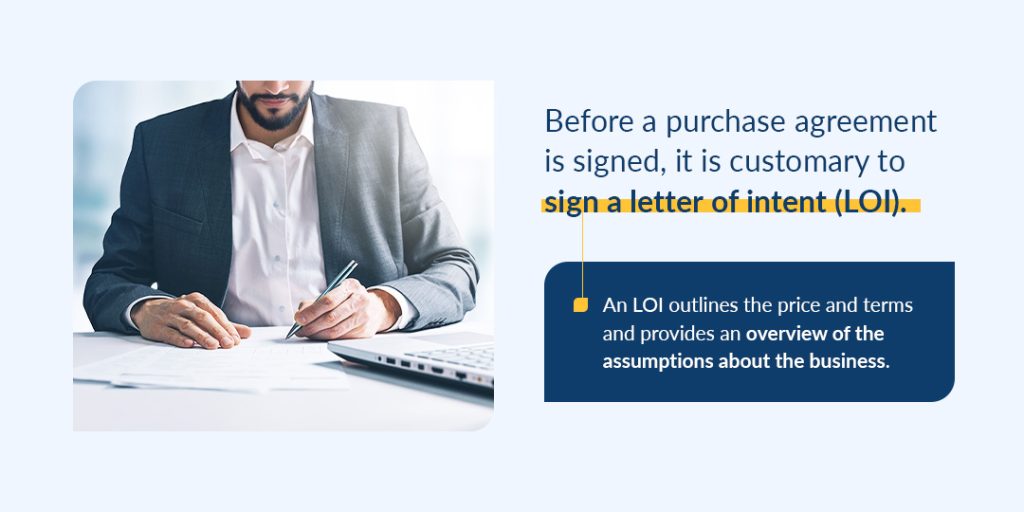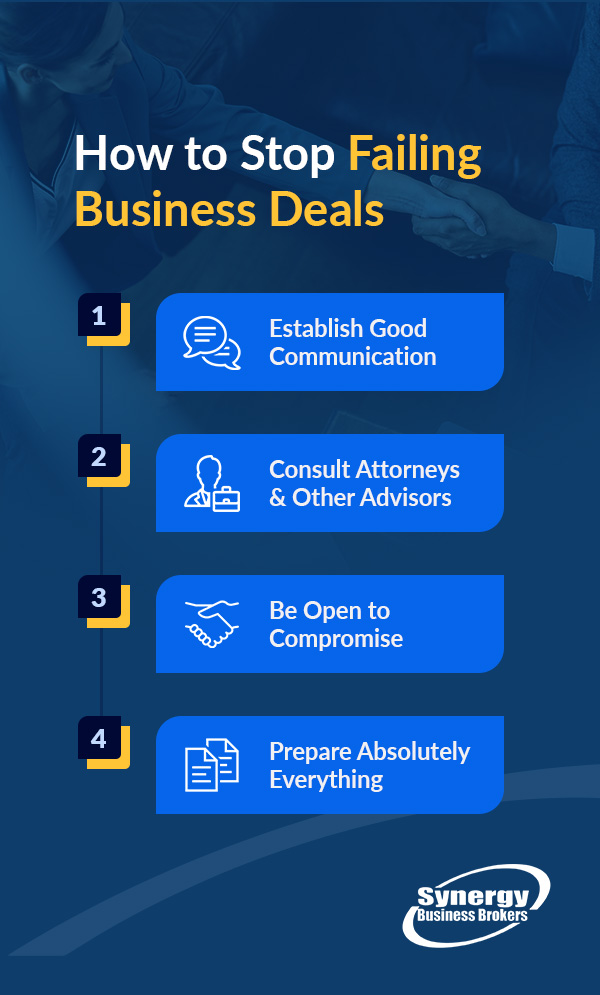
Blake Taylor
What Is the Best Way to Sell a Profitable Business?
Selling a profitable business is one of the most significant financial decisions you can make as a business owner. A …
7 MIN READ
Read More

Selling your business is one of the most important and emotionally charged financial decisions you can ever make. Whether it is your first company or just your most recent, the goal is always the same. You want to secure the best possible outcomes for your hard work. However, here is the truth many avoid talking about — things can go wrong during the sales process. When this happens, the cost is more than financial. It can impact your future, your employees and your peace of mind.
No accepted offer is ever 100% until the deal is closed. So, what goes wrong when selling a business? Learn the answer and what can be done to try and prevent this from happening so that you can have a successful closing where everybody is happy.
Selling a business is a complex transaction that blends finances, emotions and relationships. There are a lot of moving parts, more personalities and many variabilities that can derail the deal. From mismatched expectations to financial hiccups and emotional roadblocks, explore common reasons below.
When a potential buyer makes an offer, they will do so based on the financial information presented to them. If, during due diligence, it’s discovered that this initial information is not confirmed and there are discrepancies, this will often cause a deal to fall apart. It’s essential to understand the reason for the difference, and if there is a valid reason, it’s important to communicate this effectively to the buyer and their accountant so that the buyer’s trust is not lost. If the discrepancy is minor and there is a valid reason, the deal can usually stay on track.
Business valuation is the process of determining how much your company is worth in the market. Overvaluing can scare away serious buyers or lead to endless negotiations that ultimately go nowhere. Undervaluing means leaving money on the table. Hire a qualified valuation expert with industry-specific experience. Look at Earnings Before Interest, Taxes, Depreciation and Amortization, market comparables, operational risks and growth trends.
During due diligence, buyers review your financials, contracts, operations and risks. They will walk away if they find:
Start organizing your financials well in advance, cleaning up tax filings, verifying contracts, addressing liabilities, and ensuring your ownership and governance documents are airtight. Sometimes, all of the financial information presented to the buyer is accurate, but between the time when the buyer receives the data and the time it takes to close the business, the revenue and profit of the company have declined. You want to have as recent information as possible to avoid possible negative surprises.

Before a purchase agreement is signed, it is customary to sign a letter of intent (LOI). An LOI outlines the price and terms and provides an overview of the assumptions about the business, which will be verified in due diligence. You want an agreement on these issues before spending a lot of time on due diligence, so that most of the major points can be agreed to before time is invested. A mergers and acquisitions firm can help you draft and negotiate the terms of the letter of intent, which will be used after due diligence as an outline for a purchase and sale agreement.
If, during due diligence, the buyer discovers that there really isn’t much of a business without the owner, buyers may head for the hills. When the owner is the face of the company, the rainmaker, the decision-maker or holds all the operational knowledge, it creates risk. Buyers worry that once the owner departs, the business may not function and the revenue may disappear. Start transitioning key responsibilities to trusted team members well before listing your business. Build systems, document processes and develop new leadership roles.
Customer and supplier relationships can be major deal-breakers, especially if they are too concentrated or informal. Buyers may see a fragile business model if a large portion of revenue comes from just one or two clients or if key supplier contracts are handshake deals. It is crucial to diversify your customer base where possible and secure long-term contracts with key partners. Should this be an unrealistic goal, be prepared to justify it with strong retention metrics, mitigation plans for turnover and relationship depth.
If you are selling a manufacturing and distribution business or another company that relies heavily on suppliers, it will be necessary for a potential buyer to be confident that the most critical suppliers will stay with the company after the sale. If there are written supplier agreements in place, you’ll want to point that out to buyers, as well as the length of the supplier relationship, so that you can provide a seamless transition to transfer these relationships.
Sometimes, the seller will finance part of the purchase price to avoid the bank’s financing procedures and at the buyer’s request. The key with seller financing is for both the seller and the buyer to be confident that the business will succeed with the new buyer. Once you have established this after meeting in person and exchanging information, the terms can be negotiated. Keep in mind that seller financing is not usually as large of a percentage as bank financing. Seller financing typically ranges from 10% to 60% of the purchase price.

Emotional bias is the tendency to let personal attachment or stress influence business decisions. Sellers may sabotage deals, reject fair offers or rush into a bad agreement simply to get the deal done. It is a good idea to have a trusted advisor, whether they are a financial planner, broker or attorney. This person is not emotionally invested and can provide a level-headed perspective when emotions run high.
The buyer may also get cold feet and change their mind about buying the business. It is less likely that the experienced buyer will get cold feet compared to first-time potential buyers, particularly if that first-time buyer is still employed or looking for a job as an option versus buying a company.
Any number of personal issues can come up that can potentially derail the deal. For example, there have been scenarios where, during due diligence, the buyer has a major health problem or an immediate family has a major issue that requires attention. In this case, you can give the buyer additional time to resolve the issue. If it is going to be a while, then it might be best to move on to another potential buyer.
Location is usually a critical piece of any business sale, as buyers are acquiring your customer base, brand and equipment, and they expect to take over your physical space. Your lease can halt a deal when:

When a business sale falls apart, it can cost time, energy, trust and momentum. However, failed deals are often not the result of a bad business — they are due to avoidable mistakes. A successful business deal is built on preparation, trust, transparency and expert guidance.
Poor communication is one of the fastest ways to lose a buyer’s trust. Missed details, slow response times or unclear expectations can breed doubt, which often leads to delays or walkaways. Make sure there is a clear point of contact on both sides of the deal to prevent miscommunication or conflicting messages.
There is always some give and take in getting a deal done. There are a lot of details to be negotiated, and it’s best to keep calm when disagreements arise. This helps keep either buyer or seller from walking away from the deal because they feel they can’t get along with the other person. This is why face-to-face meetings are important to establish chemistry and a good relationship between buyer and seller before they decide to move forward on a deal.
Trying to sell your business without financial and legal guidance is inadvisable. Before you list your business, involve these people:
Unofficial advisors, such as friends and family, may be well-meaning with their advice, but most have not purchased or sold a business, and if they have, it’s usually only one or two experiences that they have had. It’s important to listen to advisors who have handled many business sales transactions and then draw your own conclusion rather than being swayed by friends who really don’t have the details or much information about the process.
Deals fall apart when either party digs in their heels. Whether it is due to pricing, terms or timelines, an unwillingness to bend can sink even the most promising transactions. Know your non-negotiables, but do not let your ego kill a fair offer. Stay focused on your “why” and understand the market value of your business. This information will allow you to structure deals creatively, such as with earn-outs or seller financing, to bridge gaps when necessary.
Buyers perform deep due diligence. It raises concerns if your records are disorganized or your numbers do not add up. To combat these administrative slips, prepare by:
Selling your business is about protecting your legacy, financial future and everything you have built. While the road can be bumpy, with the right preparation, mindset and team, you can avoid the common pitfalls that contribute to why business deals fall apart and walk away on your terms. Choosing an experienced Business Broker who only gets paid if the sale closes is essential. You can be confident that if they have been around for a long time, they must be effective enough to overcome hurdles and close deals to continue to be successful. And if a deal falls apart, you want a Broker that has other potential buyers to turn to.
Synergy Business Brokers is a mergers and acquisitions firm that has been successfully closing deals for more than 20 years. We focus on manufacturing, construction, technology, healthcare, distribution, services and transportation. By partnering with us, you get marketing, advertising, a potential price estimate and individualized attention to ensure your business has the best possible chance of selling. We also will not collect a fee until your company is signed over to a new owner.
Contact us today to get started or to get more information on the sale process.
